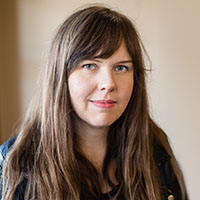
In her novel Beheld, TaraShea Nesbit brings to life voices normally kept silent in history
 By Carole Johnson, university news and communications
By Carole Johnson, university news and communications
Historical fiction is one of my favorite genres. When I heard that TaraShea Nesbit of Miami University had a new novel about the Plymouth settlers, I could not resist taking a much-needed reading adventure.
After reading Beheld, the voices of the characters still echo in my head. It’s these voices that led Nesbit down the historic path to “America’s first hometown.”
She first stumbled into Plymouth while reading an account of the colony by William Bradford, the first governor. This primary source included one sentence that mentioned his wife’s death. No details. No sentiment. One simple sentence.
Who was Dorothy Bradford? What happened to her? And, what about the other females who settled in Plymouth?
As Nesbit researched, long-ago female settlers began speaking loudly in her head. During a teaching semester in London, the character of Eleanor Billington came alive in Nesbit’s mind. She heard this cockney accent of an indentured servant.

TaraShea Nesbit
Then, while reviewing Plymouth court records, Nesbit uncovered what was the first-ever murder trial for the colony. She also uncovered a line in another document: “Billington executed at Plymouth for murdering one.” — John Winthrop, Governor of the Massachusetts Bay Colony, September 30, 1630.
With characters coming alive, a plot based on a real murder trial, and about five years of in-depth researching and writing, Nesbit’s second novel was released this spring to rave reviews.
- “There is a contradiction underpinning the whole project of English imperialism, and Nesbit flags it perfectly,” writes The New York Times, which selected Beheld as a 2020 Editor’s Choice.
- USA Today writes, “ Beheld disrupts expectation to render the pulsing messy lives of those too often calcified in myth.”
Creating conversations of the past
Nesbit’s goal was to humanize the Mayflower passengers. The Plymouth settlers were not just comprised of people escaping religious persecution, as often thought. Many of them were from Holland living as exiles and had freedom to express their religion, she explained. They wanted again to be considered English, fearing they were becoming too Dutch. A fair number of them also were servants, hired hands, children and indentured servants. However, the settlement was far from an idyllic community. Class conflict and governmental and religious ideology disagreements challenged the “peace” and “freedom” many sought.
“I wanted to create conversations of the past by tilting the camera toward the people we haven’t heard about, such as indentured servants and the women who were nurturing the community,” she said.
Focusing on often-times overlooked women of history is not new to Nesbit. Her first novel, The Wives of Los Alamos, a national bestseller, told the story of the making of the atomic bomb. The women’s voices were documented through recorded interviews and other firsthand accounts.
The challenge with Beheld is that it took place more than 400 years ago. Primary resources are scarce. She devoured readings from around the 1600s. Documents like diaries, wills and letters helped fill the historical facts with details. But, of course, each source has “multiple truths,” Nesbit said.
That’s the catch, even the name Puritan has a double meaning. The name stuck with the settlers through history, but it began in England as a hated nickname. Those who broke away from the organized religion of that time were ridiculed. The word “puritan” did not define a religious group, as many today believe, Nesbit explained. In fact, they were more commonly called separatists who came from various religious groups. The word ‘puritan’ meant hypocrite.
These language details give authenticity to the fictional story. The relationships between the characters shed light on the historical events around a real murder trial and some of the reasons behind the creation of Plymouth in the northeastern woodlands.
What did happen to this person named Billington and to Dorothy Bradford? Historical documents leave out the details, but the voices of Nesbit’s characters will pull you into the 1630s and down the path to Plymouth. I recommend the journey.
About TaraShea Nesbit
TaraShea Nesbit is an assistant professor of English in fiction and creative nonfiction. She was a finalist for the PEN/Bingham Prize for The Wives of Los Alamos (New York: Bloomsbury, 2014), The novel also was an Editor’s Choice by The New York Times, among its other accolades. She received an Ohio Arts Council Individual Excellence Award in 2018 which aided her research for Beheld (New York: Bloomsbury, 2020).
